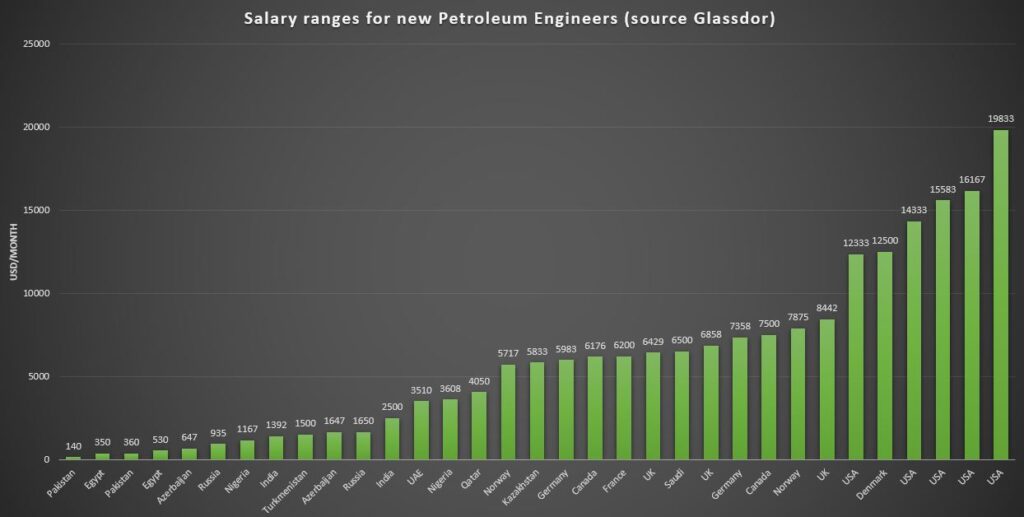As you prepare to step out of the university gates and into the professional world, one of the foremost questions on your mind might be about your potential earnings as a newly minted Petroleum Engineer. Understanding salary expectations is crucial as it helps set realistic career goals and financial planning. We’ve compiled statistical data from Glassdoor, highlighting the monthly salaries for new or low-experienced Petroleum Engineers across various companies and regions. This guide will help you navigate through this information, setting the stage for your upcoming career journey.
Understanding the Salary Spectrum
The salaries for new graduates or those with up to two years of experience can vary significantly based on the company, country, and region. Here’s a quick breakdown of some key insights (according to Glassdoor data):
Asia:
- Lowest Salary: OGDCL in Pakistan offers around $140.
- Highest Salary: Shell in India provides up to $2,500.
Africa:
- Lowest Salary: Petbrel in Egypt at $350.
- Highest Salary: Chevron in Nigeria at $3,608.
Europe:
- Lowest Salary: Wintershall Dea in Germany at $5,983.
- Highest Salary: Total in Norway at $7,875.
North America (NA):
- Lowest Salary: Chevron in the USA at $12,333.
- Highest Salary: Conoco in the USA at $19,833.
Middle East:
- Lowest Salary: ADNOC in UAE at $3,510.
- Highest Salary: Saudi Aramco in Saudi Arabia at $6,500.
Key Takeaways
- Significant Variability: The data clearly shows that salaries can vary greatly not only by country but also by the company within the same country. For instance, in the USA, salaries range from $12,333 to $19,833.
- High-Paying Regions: North America, particularly the USA, and parts of Europe such as Norway and the UK, tend to offer higher salaries compared to other regions.
- Emerging Markets: Countries like India and UAE also offer competitive salaries, reflecting the growing opportunities in these regions.
Beyond the Base Salary
It’s essential to note that these figures represent base monthly salaries and do not include other benefits that companies often provide, such as:
- Health Insurance
- Housing Allowances
- Bonuses
- Retirement Plans
- Educational Allowances
These benefits can significantly enhance the overall compensation package, making some lower base salaries more attractive when considering the complete remuneration package.
The Importance of Living Costs
When evaluating a job offer, it’s vital to consider the cost of living in the region where the job is located. A higher salary in one country might not stretch as far as a lower salary in another due to differences in living expenses. Here’s a comparison of living costs across some key regions:
Asia:
- Pakistan and India: Generally lower living costs, making salaries like $2,500 from Shell in India quite competitive.
- UAE and Saudi Arabia: Higher living costs, but often offset by benefits such as housing allowances.
Africa:
- Egypt and Nigeria: Lower living costs but also lower salaries. However, companies often provide additional benefits to make up for this.
Europe:
- Germany, UK, and Norway: High living costs, but salaries are also significantly higher. Consider benefits such as healthcare and housing.
North America:
- USA: High living costs in many states, but salaries are the highest globally. Additional benefits are crucial to evaluate.
Middle East:
- UAE and Qatar: High living costs, but companies often offer comprehensive benefits to attract talent.
Before making a final decision, research the living costs in the job location thoroughly. Websites like Numbeo and Expatistan can provide detailed cost of living comparisons.
Adapting to Cultural Changes
Moving to a new country for a job can be an exciting yet challenging experience. Understanding and adapting to different cultural norms and practices is crucial for a smooth transition. Here are some aspects to consider:
- Work Culture: Work hours, hierarchy, communication styles, and expectations can vary widely between countries.
- Social Norms: Be aware of local customs, traditions, and social etiquette to better integrate into the community.
- Language: Learning the local language or at least basic phrases can greatly enhance your experience and help in daily interactions.
- Lifestyle: Adapting to different food, weather, and lifestyle choices can take time. Be open-minded and willing to embrace new experiences.
Tips for Young Petroleum Engineers
- Do Your Research: Look beyond the salary figures. Research the companies, their culture, growth opportunities, and additional benefits they offer.
- Consider the Location: The cost of living can vary dramatically between regions. A higher salary in one country might not go as far as a slightly lower salary in another.
- Network: Connect with alumni and professionals in the industry. They can provide insights and potentially help you get your foot in the door.
- Keep Learning: The oil and gas industry is constantly evolving. Pursuing additional certifications and staying updated with industry trends can make you more competitive and open doors to higher-paying opportunities.
- Market Yourself: During interviews, it’s crucial to present yourself as knowledgeable and confident. Highlight your skills, experiences, and willingness to learn. At Nexus OFS, we offer various webinars and courses to help you enhance your interview skills and industry knowledge. Check out our website www.nexusofs.com and follow us on social media for updates on upcoming training sessions.
- Consider Safety and Security: When choosing a job location, especially in the oil and gas industry, consider the safety and security of the region. Research the political stability, crime rates, and any potential risks associated with the job location. Companies often provide security measures and safety protocols, but it’s important to be aware and prepared.
Conclusion
Entering the workforce as a Petroleum Engineer offers a range of financial prospects, depending on where and for whom you work. Understanding the landscape of entry-level salaries and considering the full scope of employment benefits can help you make informed decisions about your career. Stay curious, keep learning, and network actively to navigate your path successfully in this dynamic field.
Welcome to the exciting world of Petroleum Engineering – your journey has just begun!



Very useful information. Thank you for sharing! Please update once there are new informarion.
I’m in the mood for something sweet and spicy… you? – https://rb.gy/es66fc?cahcoale
“I want to know what makes you tick. Let’s chat on https://rb.gy/44z0k7?cahcoale !”